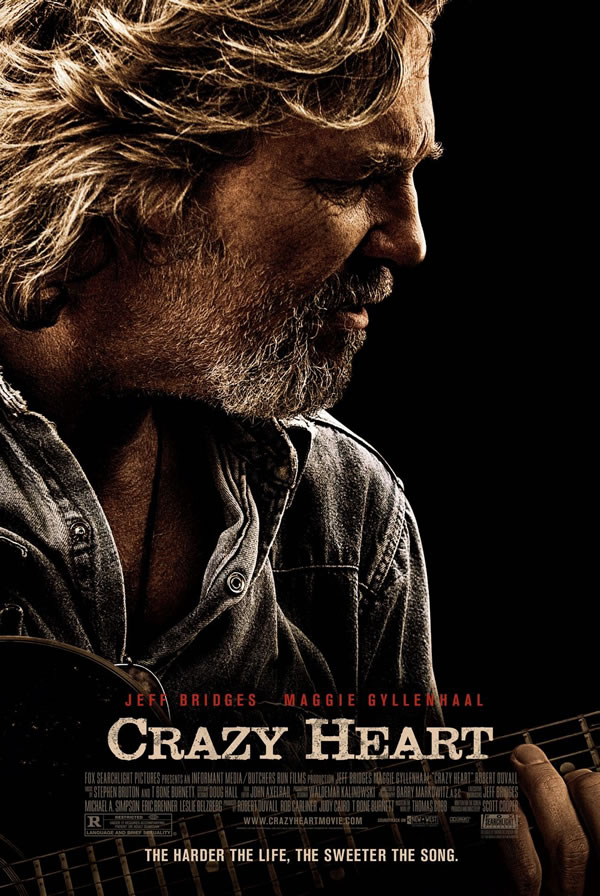 There’s a moment in “Crazy Heart†where its hero, an aging country-music star who calls himself Bad Blake (Jeff Bridges), is asked what inspired all of his material. “Life, unfortunately,†he says, speaking with the air of someone who sees his talent as more of a curse than a gift. Still, he prefers the realism of the songs he was famous for to the naiveté of the stars who replaced him, and even though it’s hard for him to keep up appearances when he’s reduced to performing in bowling alleys just to make ends meet, he seems to understand that the drive behind his music comes from his courage to take a good and honest look at himself.
There’s a moment in “Crazy Heart†where its hero, an aging country-music star who calls himself Bad Blake (Jeff Bridges), is asked what inspired all of his material. “Life, unfortunately,†he says, speaking with the air of someone who sees his talent as more of a curse than a gift. Still, he prefers the realism of the songs he was famous for to the naiveté of the stars who replaced him, and even though it’s hard for him to keep up appearances when he’s reduced to performing in bowling alleys just to make ends meet, he seems to understand that the drive behind his music comes from his courage to take a good and honest look at himself.
Of course, what he discovers is rarely flattering. He spends a lot of time on the road in his weathered pickup truck to show up for various gigs that his manager (James Keane) lands for him, and his alcoholic tendencies are such that it’s not unusual for him to run offstage and vomit in the parking lot. Most of the people who come out to watch him perform look as if they can’t be any younger than 50, and there are times when the other musicians onstage have more energy than he does. Although everyone in the audience still loves him, they might be applauding a memory instead of a man.
When a journalist named Jean (Maggie Gyllenhaal) arranges an interview with him for a feature story about his legacy, she tries to shed some light on the darkest corners of his life, like the wife and 4-year-old son who he abandoned and hasn’t spoken to in years. The only thing that he’s more reluctant to talk about than that is his old protégé Tommy Sweet (Colin Farrell), who got so big that he took the spotlight from him – when Bad’s manager tells him that he can make better money by opening for Tommy at his next show, he’s less than thrilled about playing second fiddle to the star he created.
At least there’s some good news when it comes to his personal life: He gradually warms up to Jean’s interest in him, and he comes to trust her so much that it isn’t long before they fall in love. He even spends quality time with her son Buddy (Jack Nation), and although Jean admits that she has had lots of bad luck when it comes to men, she becomes so attached to Bad that the idea of losing him leads to a tearful altercation.
“Crazy Heart†isn’t interested in melodrama, though. It pays more attention to the experiences its characters are faced with and how they handle them, and both Bridges and Gyllenhaal provide the movie with the presence it needs. Even during Bad’s most mundane and private moments, you can feel Bridges digging deeper into the role, and Gyllenhaal’s command over her performance is such that she can personify Jean on her own terms, giving her character the mystery she deserves.
Only Farrell seems to have a problem as Tommy: His Southern accent has a strain to it that’s mild but distracting, and he doesn’t have the same edge that his co-stars do.
Part of the reason their performances work so well is because the dialogue has just as much wisdom as they do about how their characters feel and think, and there’s never a moment when the rugged beauty of Scott Cooper’s script tries to overwhelm the actors – they’re not stuck with language that betrays their characters. It’s a shame that movies with as much skill as this one have to wait until Oscar season to get some attention, but at least any attention (or Oscars) “Crazy Heart†gets will be well earned.

Leave a Reply